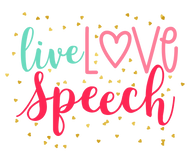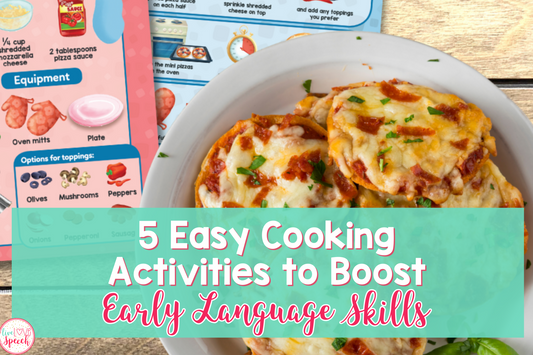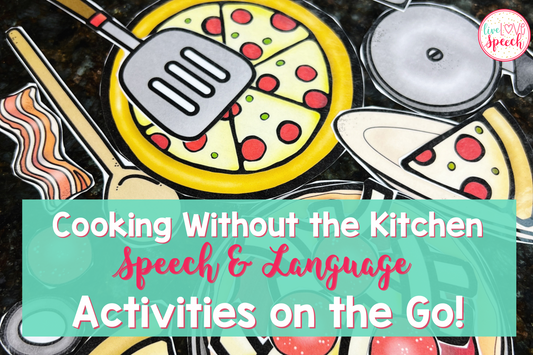Play-based therapy is something I like to use in my therapy sessions because it makes our time seem less like work and more like fun! I don’t know about you but when the students are having fun they are more like to actively participate, and that includes with their oral language. Play-based therapy is great because it uses enjoyable activities such as playing with toys to target speech and language development and goals.

It is great for young children because while it may look and feel like regular playtime, it is actually so much more. Play not only provides a context for learning, but it can also be very fun and motivating for a child! It also goes hand in hand with building strong cognitive skills and language development. Here are some of my favorite play-based activities I’m sure you and your students will love.
BENEFITS OF PLAY-BASED THERAPY
There are tons of benefits to incorporating play-based therapy into your routine. It creates a meaningful opportunity for learning and communication.
Play-based therapy also allows children to socialize with their peers and work on joint attention. This type of therapy shows children how to accomplish certain tasks by modeling.
It also works on strengthening important cognitive abilities that are so important for young children. Play-based therapy indirectly targets abstract thinking and problem-solving skills, all while the child is playing and having fun.
IMPLEMENTING PLAY-BASED THERAPY
So how do we implement this type of play into our classrooms or therapy sessions? Don’t worry, it doesn’t have to be hard, time consuming and you don’t need to run right over to the nearest toy store.
Start by creating meaningful opportunities for learning and communication using toys, imaginative or pretend play activities. As I get to know my students I can target these play activities towards their interests or choose an activity that aligns well to their learning goals.
Allow the child to take the lead as much as possible to guide and direct the activity through play. Then weave in the target skills through the play-based activities. Get in there and join in the fun! When the student feels like you are playing with them you build connection you have which helps as you model, guide and instruct.
SETTING UP A PLAY-BASED SESSION
STEP 1: CHOOSE YOUR TARGETS
I always like to plan my play-based therapy with the end in mind. This means that I start by looking at the goals for each child. As I look at their goals I can break them down into smaller steps that need to be met in order to accomplish the big goal. These smaller steps become my targets for each session.
It is important to know exactly what your target is as you plan your session. Since play-based therapy allows the client to have say in the direction of the activities, having your specific goals laid out makes it all the easier to weave them into the play activities.
In addition to the target, I like to prepare a list of words, phrases or concepts that I can refer to during our session. Often this goes onto a checklist that I use to keep notes during the session. This makes it so much easier to focus on those targets.
STEP 2: CREATE SCENARIOS
I like to structure play-based therapy using scenarios or scenes that my students can relate to. By choosing a scenario I can have a pretty good idea of words, phrases and concepts that can be easily woven into the therapy session. Sometimes they will take the play in a direction I didn’t see, but the vast majority of the time it goes off as planned.
Once I have my scenario chosen and my targets laid out, I’m ready to dive in with the students. By preparing this in advance I can make sure that I have everything I need for students to get the repetitions they need to practice their target skills.
STEP 3: MAKE YOUR TARGETS MEMORABLE
The last thing I like to do is make sure that our play activities are fun and memorable for the kids. By doing this, the student is more likely to remember the lesson and activities afterward. It also provides them with an experience that they re-enact at a later time.
Some of my favorite ways to increase engagement and make our play-based therapy memorable is through toys and games, hands-on activities, cooking activities and crafts. While some are better for a play-based therapy approach ALL are great for engaging students during therapy sessions.
ENGAGE WITH TOYS
Play-based therapy and toys go hand in hand. But don’t worry, it’s not just a free-for-all play time. Instead, with your planning and intentional questioning, students can work on so many different skills and concepts. I like to use these visuals to get students talking, describing and answering questions.
Having these hands-on visual cards allows students to interact with the toys and language during the session. These picture and word cards allow for the teaching of new vocabulary, modeling and answering questions.
This evidence-based resource was created specifically for play-based therapy sessions. Using the included sets for 16 different toys you will be able to target the following skill areas, verbs, adjectives, basic concepts, CV, VC, CVC, stops, consonant clusters, fricatives & affricates, liquids, and questions.
In addition to all of that, children will be able to work on skills like following directions, expanding utterances, requesting, labeling, describing, commenting, joint attention, and cognitive skills.
Take a look at just a few of the toys I use these visuals with:
Having these picture and word cards for a variety of different toys makes it easy to plan and create scenarios that every student will love!
DATA TRACKING MADE EASY
Any time I can save time in my session prep I take advantage of it! We all know that the To-Do List is never ending. So having ready to use data tracking sheets for each of these toy card sets helps is a time saver for sure! These ready to print data sheets make it easy to track individual progress in students. And with the words and phrases already selected I save time that I can use in other activities.
When I have specific words or concepts I want to target, I just grab my highlighter and mark the ones we are going to focus on. Sometimes I choose to target different words and concepts in different sessions. Using different colors to highlight the day’s focus allows you to stay focused each and every session.
THE BEAUTY OF PLAY-BASED THERAPY
Hopefully, by now, you understand the beauty of play-based therapy and all it has to offer young students.
Play-based therapy provides endless opportunities for speech and language development, all while having so much fun! With this type of therapy, you can capture your student’s attention easily and create lasting memories with them that will extend well beyond your sessions.
To me, this is essential because it supports learning, retention, and developing important skills in a fun, engaging way. Don’t forget to check out my jam-packed resource loaded with everything you will need to run a successful play-based therapy session. I hope you and your students enjoy this type of play and learning like we do! It really is so special and helpful!
PLAY-BASED THERAPY ULTIMATE PACK
You can grab all of these Visuals for Toys in the Live Love Speech TpT store. This bundle includes picture and word cards for 16 toys, core words, carrier phrases and data sheets. Not only will it save you lots of time, but it will make play-based therapy fun for your students. Be sure to grab the Visuals for Toys Pack for your speech therapy and SPED students to use this year.
SAVE THESE PLAY-BASED THERAPY IDEAS FOR LATER
Pin these play-based therapy ideas to your favorite classroom Pinterest board so you can quickly and easily find them later!

















